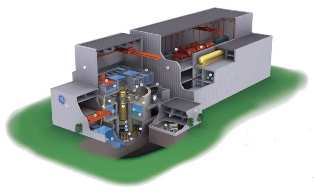 The country is facing the shutdown of its reactor fleet, which will leave it with just one operating nuclear power plant, Sizewell B, by 2023. An electriciy supply gap could begin to grow by 2014 and the country's leaders are keen to retain nuclear energy as an option for its private electricity generation industry.
The country is facing the shutdown of its reactor fleet, which will leave it with just one operating nuclear power plant, Sizewell B, by 2023. An electriciy supply gap could begin to grow by 2014 and the country's leaders are keen to retain nuclear energy as an option for its private electricity generation industry.To that effect the resources of the Nuclear Installations Inspectorate (NII) will be focused on approving a small number of reactors which would likely be built in series by consortia. The NII has approved the UK's two generations of gas-cooled reactors and one pressurized water reactor (PWR), Sizewell B.
The most likely candidates for the list are Westinghouse's AP1000 and Areva's EPR - both PWRs.
Until now, observers considered GE's ABWR and ESBWR boiling water reactors (BWRs) as unlikely for inclusion, mainly because the UK skills base only has operational experienced with the Sizewell B PWR and one small experimental heavy-water reactor. In addition, British Energy has made investment in maintaining its capability in PWR operation, seeing the design as the most likely for future deployment. Another possibility seen as relatively unlikely for the approval list would be AECL's Advanced Candu Reactor (ACR), a pressurized heavy-water reactor.
Nevertheless, Andy White, CEO of GE Nuclear told World Nuclear News that he has held several high-level discussions on the possibility of employing BWR technology. Furthermore, documents on GE's proposals for UK BWRs were submitted to the Department for Trade and Industry in mid-April.
White said that many of the former disadvantages of BWRs compared to PWRs, such as a higher radiation dose rate for workers, were things of the past. BWRs have excellent operating records, he said, and previous investment in the UK in favour of PWRs should not count against BWRs because the two "are not so different."
According to White, ESBWRs outputting 1520 MWe could be built for $2.8-3.6 billion. The design is expected to receive design approval from the US Nuclear Regulatory Commission during 2007 and is proposed for build at three site in the USA.
Further information
GE Nuclear
WNA's Nuclear Power in the United Kingdom information paper







_94566.jpeg)






